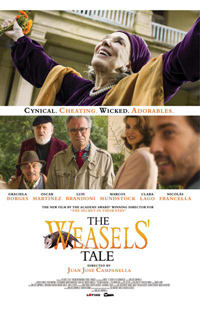Pop Goes the Remake: Campanella Returns with Ghoulish Remake of Black Comedy
 In the 2000s, the New Argentine Cinema gained international prominence thanks to a handful of filmmakers such as Fabian Bielinsky, Pablo Trapero and Lucrecia Martel (following an arthouse resurgence in the 1990s, where Martin Rejtman was a prominent trailblazer), but it was Juan José Campanella and his Academy Award Win for Best Foreign Language Film with 2009’s The Secret in Their Eyes which would gain the most attention in the US.
In the 2000s, the New Argentine Cinema gained international prominence thanks to a handful of filmmakers such as Fabian Bielinsky, Pablo Trapero and Lucrecia Martel (following an arthouse resurgence in the 1990s, where Martin Rejtman was a prominent trailblazer), but it was Juan José Campanella and his Academy Award Win for Best Foreign Language Film with 2009’s The Secret in Their Eyes which would gain the most attention in the US.
Both before and after this distinction, Campanella was involved in a diverse array of American television in between film projects (such as “Strangers with Candy,” “House,” “30 Rock,” and “Law & Order: Special Victims Unit”) which make his interests difficult to peg. He returns for his first live-action narrative feature since his Oscar win with The Weasels’ Tale, itself a remake of the 1976 title from Jose A. Martinez Suarez, Yesterday’s Guys Used No Arsenic, one of the few examples of the country’s “new cinema” which arrived well before the country’s post-junta phase, prior to the establishment of democracy in 1983. Featuring a quartet of some of Argentina’s finest notables, Campanella’s latest is a jaunty dark comedy perfect for those who prefer their laughs accompanied by a little murder and manipulation.
Although its marketing materials suggest something along the lines of an Alex de la Iglesia endeavor, The Weasels’ Tale really hearkens back to an old-school pattern of filmmaking, a constant barrage of barbs sailing through the outlandish twists one would expect from a telenovela. And while it eventually feels a bit overwhelming with one too many turns of the jagged screw, it’s consistently entertaining.
The beating heart of the film is Graciela Borges, perhaps best known to English speaking audiences thanks to her role in Martel’s debut La Cienega in 2001 (though her filmography, which stretches back to the late 1950s, includes a number of notable performances, including 1971’s Chronicle of a Lady). Eerily, her characterization of Mara Ordaz plays like the sunnier version of similar dysfunctional familial antics on a palatial estate in Pablo Trapero’s more subversive La Quietude (2018). Still, the script spares no moment in allowing her to unfurl her contempt and disdain for her geriatric housemates (and, as it turns out, for Sophia Loren), and every moment she’s on screen is a compelling one.
As far as her trio of male housemates, The Weasels’ Tale hits some stretches of monotony, although Oscar Martinez, Luis Brandoni and Marcos Mundstock (who passed away earlier this year) all receive shining moments, particularly Mundstock in a nicely orchestrated sequence of pool with Clara Lago’s resourceful femme fatale. Passing references to the political upheaval in 1970s Argentina explains how this quartet (originally a sextet) came to fruition, but for those unfamiliar with the country’s history the weight of such subtexts might be lost on some audience members since they’re so briefly attenuated. Lensed by his Eyes DP Felix Monti, The Weasels’ Tale plays like a well-crafted poisonous soap opera, unafraid to be as macabre as it is silly.
★★★/☆☆☆☆☆


